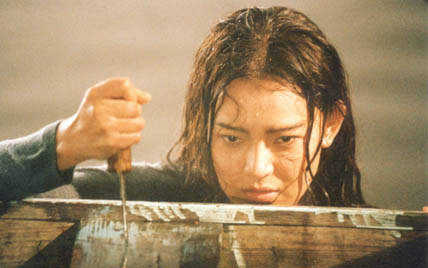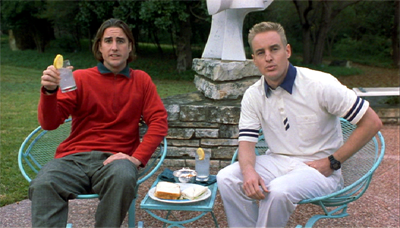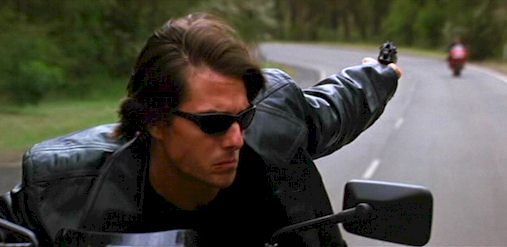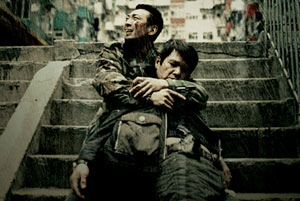
Directed by Kim Ki Duk
Since releasing his breakout film "The Isle" to a firestorm of controvery on the international film circuit, censorship in the UK and public indifference in his native South Korea, Kim Ki Duk has cemented his reputation as one of Korea's most provocative and talented directors. "The Isle" remains one of Kim's signature works as well as his most controversial and debated film which has fueled its continued popularity despite its relative weakness when compared to some of Kim's better efforts.
Seo Jung plays Hee jin a women who owns and operates a small fishing lake, ferrying customers to and from the shore towards small boat houses in a dilapidated motorboat. Hee jin's rather monotonous existence is interupted by the arrival of Hyun jin (Kim Yu-Seok), a man on the run from the law who decides that the best place to hide out is in the middle of a lake near a bunch of other potential witnesses with no way back to the shore aside from Hee jin's boat. Maybe not the greatest tactical maneuver, but then again I've never been on the run from the cops, so what do I know? Hee jin soon becomes interested with Hyun jin, an interest that quickly turns to infatuation, jealousy, violence, self mutilation and even (mutiple) murders.
By far Kim's most controversial film, "The Isle" has been accused of everything from misogyny to animal abuse and its content is strikingly at odds with most of Kim's later material which, although containing some sensational elements here and there, was never again as lurid as "The Isle." Although the film is far less violent than made out to be and as misogynous as it is misandrous (the relationship between Hee-jin and Hyun-sik being tumultuous and at times abusive but in equal measure on both sides) it's still a rather intense picture and I can certainly see where the controversy stems from.
Despite its tumultuous birthing onto the international film circuit, there is a lot to recommend in "The Isle" and it stands out as one of Kim's more ambitious works. Like many of his films, Kim again chooses to place his action in a confined, man made space (in this case a fishing retreat on a small lake) that considerably confines his characters in their interactions, often in awys that seem to define common sense. In one memorable scene of "The Isle" Hee Jin kidnaps and then kills Hyun-sik's admirer but only goes to the edge of the lake to dispose of her body, almost as if she is not allowed to go any further. Likewise when the deceased admirer's pimp is killed by Hyun-sik in a fistfight, he is similarly "buried" only a few yards away from the other boat houses. Despite its confined location, "The Isle" is beautiful to look and features some fantastic cinematography that contrast nicely with some of the film's more gory images.
For all that is good in "The Isle," however, I still get the impression that it was done mostly as a way for Kim to "shock himself" onto the film circuit. Kim appears to be less interested in exploring his character's particular psychological demons than watching them abuse each other and some scenes in the film border on gratuitous. Kim's films have always included elements that were either shocking or controversial so "The Isle" was completely out of character for Kim, but when compared to some of his better works there isn't much argument that can be made against the fact that Kim is better when he practices a bit of restraint.













